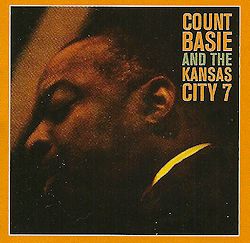Kansas City 7
1. Oh, Lady Be Good
2. Secrets
3. I Want A Little Girl
4. Shoe Shine Boy
5. Count's Place
6. Senator Whitehead
7. Tally-Ho, Mr. Basie!
8. What'cha Talkin'?
9. Trey of Hearts
Count Basie
– Piano, organ
Thad Jones
– Trumpet
Frank Wess
– Flute, alto flute (tracks 2, 6, 8, 9)
Frank Foster
- Tenor sax, clarinet (tracks 1, 3-5, 7)
Eric Dixon
– Tenor sax, flute, clarinet
Freddie Green - Guitar
Eddie Jones
– Bass
Sonny Payne
– Drums
Memories Ad-lib
10. Ain't Misbehavin'
11. I'll Always Be In Love With You
12. Sweet Sue, Just You
13. If I Could Be With You
14. Dinah
15. Sometimes I'm Happy
16. Baby Won't You Please Come Home
17. Call Me Darling
18. The One I Love Belongs To Somebody Else
19. Memories Of You
20. Honeysuckle Rose
21. All Of Me
Count Basie - Organ
Joe Williams - Vocals
Freddie Green - Guitar
George Duvivier - Bass
Jimmy Crawford - Drums
Harry "Sweets" Edison - Trumpet (tracks 10, 12, 13, 15)
Count Basie was renowned for leading one of the best swing bands ever. But he was also happy to play in small groups, often with personnel selected from
his big band. Over the years, these groups had various names, such as Jones-Smith Incorporated, Basie's Bad Boys, and the Kansas City Seven. The original
Kansas City Seven included Buck Clayton, Lester Young, Dicky Wells and the famous Basie rhythm section (Basie, Green, Page and Jones).
This 1962 LP comprised a new line-up which almost matched the original personnel, although there was no compensation for the lack of Lester Young.
Nonetheless, tenorists Frank Foster and Eric Dixon fulfil their roles superbly. They both sound a little like Paul Gonsalves in their solos on the opening Oh, Lady be Good. The septet also includes Frank Wess, whose flute is an asset to the group. Frank plays an airy solo on alto flute in his own
beautiful composition Secrets. The front line is completed by trumpeter Thad Jones, who states the melody of I Want A Girl with a wa-wa
effect.
Shoe Shine Boy
(as well as Oh, Lady be Good) was one of the tunes on Basie's first small-group recording, Smith-Jones Incorporated, in 1936. Dixon and
Foster again contribute good tenor solos, and the usually extrovert Sonny Payne plays drum breaks with brushes. Count's Place is a typical Basie
head arrangement of the blues, based on riff motifs. Senator Whitehead is a Frank Wess original in which both he and Eric Dixon play flutes, as
they do on the following What'cha Talkin'? Trey of Hearts was recorded at the same session but not included on the original LP. It is another
flute salad.
Throughout this LP (and especially in Oh, Lady Be Good), the rhythm section from the current Basie band supplies a gorgeously swinging background.
And there are plenty of characteristic solos from Basie: economical but making the most of every note.
The other LP contained on this 77-minute CD is the rather unusual Memories Ad-lib, another small-group recording but this time spotlighting singer
Joe Williams. It was recorded in 1958, when Williams was halfway through his tenure with the Basie band. Basie is famous for his understated playing but
this whole album is understated. The musicians play so quietly as to be almost inaudible, but this suits the relaxed mood of the album. Trumpeter Harry
Edison is listed on the sleeve as only playing on track 13 but I can hear his trumpet, muted and distant, on four tracks.
Count Basie plays organ throughout the album and, with the subtle rhythm section, he lays down a soft cushion for Joe Williams' vocals, which are warm,
mellow and masterfully phrased. If I Could Be With You and Dinah are prefaced by their seldom-heard verses. Call Me Darling is
taken at almost as slow a tempo as Basie's famous recording of Li'l Darlin'. Ain't Misbehavin' and The One I Love Belongs To Somebody Else have rare guitar solos from Freddie Green.
This CD is a well-filled album containing much good music.
Tony Augarde
www.augardebooks.co.uk
